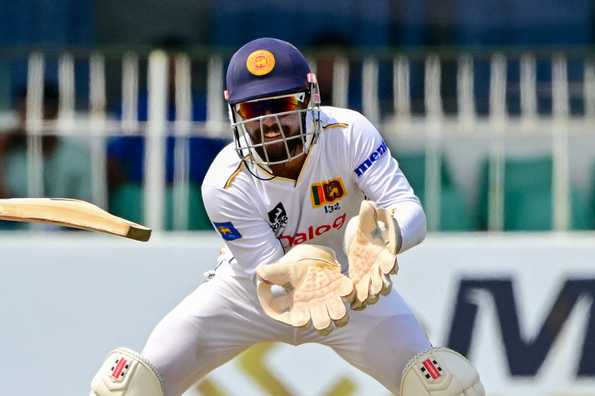Kusal Mendis, the Sri Lankan wicketkeeper-batter, expressed confidence that a lead of 150-200 runs would place his team in a dominant position, especially with spin expected to significantly influence the final two days of the ongoing second Test match against Bangladesh.
Sri Lanka concluded Day 2 with a score of 290/2, establishing a 43-run lead in the first innings, fueled by Pathum Nissanka's impressive unbeaten 146 and Dinesh Chandimal's notable 93.

"We are in a very good position, and our goal is to bat throughout the entire day tomorrow. We aim to secure a lead of 150 to 200 runs. We anticipate that the wicket will favor spin during the last two days," Mendis stated following the second day's play.
He further elaborated on the team's strategy: "We are planning to accumulate as many runs as possible – aiming for a total exceeding 400. We are hopeful that we can achieve this tomorrow."
Mendis also noted the evolving conditions of the pitch: "The grass has dried out, and footmarks are beginning to form, leading me to believe that the pitch will offer increased turn. Our intention is to avoid batting in the fourth innings. We are focused on batting deep now to put the opposition under significant pressure."
He commended Nissanka for his outstanding batting performance and acknowledged the crucial contribution of their pace bowlers in dismissing Bangladesh for under 250 runs.
"Watching him (Pathum) bat has been a real pleasure. He demonstrated exceptional skill. Even in the previous series, he consistently scored runs. It was unfortunate that he missed the opportunity to score a double century in Galle – I am optimistic that he will achieve it here. He has consistently been our top-performing batter across all three formats. He dedicates himself to improving his game, which is clearly evident."
"Our fast bowlers executed our strategies effectively. They maintained discipline in their lengths and lines. On a pitch that lacks significant pace, this is precisely what is required – not only with the new ball but also with the older ball. This is the finest display of fast bowling I have witnessed from our team in Sri Lanka."
"We anticipated that the wicket would become slower and offer more turn. Our fast bowlers performed exceptionally well and deserve considerable recognition. I anticipate that the conditions on Day Four will be significantly different from what we have experienced thus far," he added.
On the opposing side, Bangladesh head coach Phil Simmons attributed their struggles to the batting unit's failure to establish substantial partnerships. He also observed a notable change in the wicket's behavior during the second innings.
"Our critical error was the failure to build significant partnerships yesterday, which resulted in us entering today's play with only two or three wickets remaining."
"It all comes down to our batting performance and the partnerships we were unable to forge. At least two or three of our players should have capitalized on their starts yesterday and achieved significant scores. I hope we have taken note of Nissanka's excellent batting display and that we approach our second innings with the goal of scoring big runs."
"The wicket definitely improved. On the first day, it was somewhat sticky and inconsistent in pace. Today, it improved significantly, and we observed how comfortable it became for the batters. There was less turn compared to yesterday, and the batters performed well. This is an inherent aspect of Test cricket," he concluded.
| Share | Tweet |
Newer articles
Older articles
 Team India Settles in Birmingham: Rahul's Mattress, Coaches' Strolls, and the Enduring Coffee Ritual
Team India Settles in Birmingham: Rahul's Mattress, Coaches' Strolls, and the Enduring Coffee Ritual
 Android Users Urged to Patch Devices Immediately Following Critical Security Flaws Alert
Android Users Urged to Patch Devices Immediately Following Critical Security Flaws Alert
 Ashada Gupt Navratri 2025: Dates, Auspicious Timings, and Esoteric Significance Explained
Ashada Gupt Navratri 2025: Dates, Auspicious Timings, and Esoteric Significance Explained
 JPG to PDF: A Graphic Designer's Guide to Conversion & Best Practices
JPG to PDF: A Graphic Designer's Guide to Conversion & Best Practices
 Skin Cancer Alert: How to Identify Suspicious Moles and Early Warning Signs
Skin Cancer Alert: How to Identify Suspicious Moles and Early Warning Signs
 IRCTC's AskDisha 2.0: AI Chatbot Streamlines Train Ticket Booking, Refunds, and Travel Information
IRCTC's AskDisha 2.0: AI Chatbot Streamlines Train Ticket Booking, Refunds, and Travel Information
 The stat that could swing every NBA team's 2025-26 season
The stat that could swing every NBA team's 2025-26 season
 Bollywood's Mythological Muse: How Indian Epics Inspire Cinematic Storytelling
Bollywood's Mythological Muse: How Indian Epics Inspire Cinematic Storytelling
 Bollywood Flashback: Jackie Shroff Accused of Untoward Advance on Young Tabu at Danny Denzongpa's Party
Bollywood Flashback: Jackie Shroff Accused of Untoward Advance on Young Tabu at Danny Denzongpa's Party
 Popular Finance YouTuber's Account Hacked: Bitcoin Scam Alert and Security Tips
Popular Finance YouTuber's Account Hacked: Bitcoin Scam Alert and Security Tips